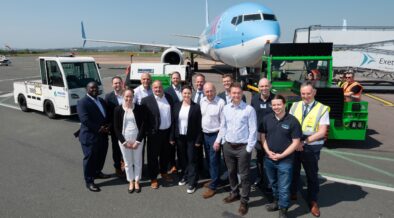
A pioneering demonstration showcasing how hydrogen can support the decarbonisation of airport ground operations has taken place at Exeter Airport in the UK – marking an important step towards achieving the first ‘zero-carbon turn’ of a commercial aircraft.
In a first of its kind for the UK, the trial, delivered by a partnership of Exeter Airport, TUI, Cranfield University, ULEMCo, MULAG and Boeing and supported by the UK Civil Aviation Authority’s Hydrogen Challenge programme, saw a TUI Boeing 737 passenger aircraft undergo a turnaround using ground support equipment powered by green hydrogen.
The live demonstration involved a hydrogen-powered baggage tug, pushback tug and ground power unit.

It is the first time in the UK – and possibly the world – that multiple pieces of hydrogen-powered equipment have been used simultaneously for a commercial air transport operational aircraft and using ‘green’ hydrogen from renewable energy sources.
Refuelling of the equipment was conducted using a HyQube 350 refueller, supplied by Fuel Cell Systems Ltd, using green hydrogen, produced and supplied by Protium.
Contributing to an academic study led by Cranfield University, the learnings from the trial are expected to help shape the future safety and regulatory framework for the airside handling of hydrogen, paving the way for hydrogen-fuelled aircraft in the years to come.
The UK’s Science Minister, Lord Vallance, said: “Fresh thinking and new regulatory approaches will give confidence to investors, researchers and consumers alike. We want to encourage businesses to choose the UK as the best destination to develop their new ideas and bring great technologies to market.
“Our funding for these 15 pioneering projects will give UK regulators and local authorities the support they need to accelerate innovation and turn it into success in every corner of the country.”

Stephen Wiltshire, managing director of Exeter Airport, which is owned and operated by Regional and City Airports, noted: “We’re proud to have hosted this important trial, which reflects our commitment to sustainability and innovation.
“The demonstration shows how hydrogen can be integrated into day-to-day airport operations, with lessons we can share across our airport group and the wider sector.
In preparation for the trial, a comprehensive study of Exeter Airport’s ground handling operations during aircraft turnarounds was conducted by Cranfield University in partnership with Exeter Airport and TUI.
The study showed that over 78,000 litres of diesel fuel were consumed in a 12-month period, resulting in nearly 200 tonnes of CO2e emissions. Ground Power Units (GPUs), which provide electrical power to aircraft when they are parked on stand, emerged as the single largest source of emissions, accounting for nearly 39% of the total.
The trial at Exeter Airport used vehicles retrofitted with different hydrogen technologies: hydrogen fuel cell (baggage tractor), hydrogen internal combustion (aircraft tug), and a hybrid dual-fuel (hydrogen-diesel) GPU.




